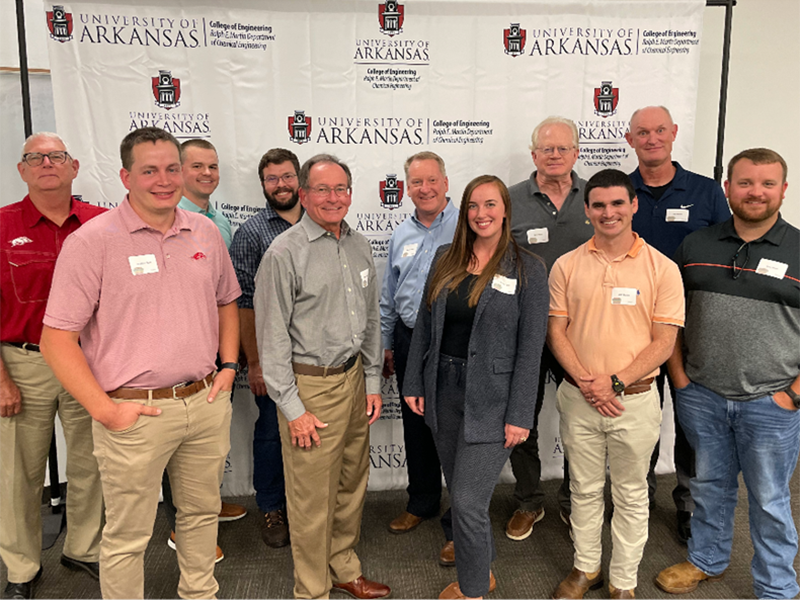Career pathways, networking tips, mock interviews and more were on the minds of students at the 2023 Chemical Engineering Mentoring Program Kickoff last month. Sophomores, juniors, seniors and graduate students gathered in person to launch the third year of the mentoring program, a semester-long commitment. Chemical engineering alumni who volunteered to serve as mentors attended in person and online in order to meet their students for the year.
Organized by members of the Arkansas Academy of Chemical Engineers and the Ralph E. Martin Department of Chemical Engineering, the mentoring program launched in 2021. The program strives to bring additional insights to students related to career opportunities, job expectations, and skills and strategies for professional success. Students participating in the program are put into small groups, called mentor circles, and meet with a mentor team of three to four alumni to discuss these topics and more. In 2022, the program created distinctive mentoring tracks for sophomores, juniors and seniors, while also expanding to engage graduate students.
To become involved in the program, students only needed to apply and commit to attending mentor circle meetings. This year, 62 students are participating in the program. Included in this year's group are 22 returning students taking advantage of a different track the new year brings them.
The mentors are alumni of the Chemical Engineering Department with a range of professional experiences. To engage alumni from across the country, mentors can meet remotely with their circle. For alumni located in Northwest Arkansas, or whose work occasionally brings them through the area, in-person meetings with students are encouraged.
Thirty-three mentors are participating in the program this year. Mentors include members of the Arkansas Academy of Chemical Engineers and other chemical engineering alumni. Academy members have at least 20 years of professional experience following their graduation, while other alumni are typically five to 10 years post-graduation. This range of alumni provides students with a breadth of career perspectives. For 2023, there are 14 mentors involved for their third year in the program.
The kickoff began with a welcome from Keisha B. Walters, department head and professor, and then an overview of the program with Kent McAllister, B.S.Ch.E. '87, and Heather Walker, teaching assistant professor and associate department head for the undergraduate program. Following that, each mentor circle met for the first time. This first meeting provided an opportunity to make introductions, set a meeting schedule for the fall, and identify the topics of greatest interest for each circle. The annual STEM Career Fair was a common discussion item, and many of the circles met again before the fair.
"This is really helping us all connect — student-to-mentor, student-to-student and mentor-to-mentor — better than we have in a while," said Ed Clausen, University Professor and steering committee member.
"We're already seeing the positive impact of our Mentoring Program," Walker said. "Students are feeling more confident and prepared for their next steps. Employers are noticing and mentioning this as well. It's wonderful to hear, and it's in large part due to the efforts of our mentors."
Steering the Way
The Chemical Engineering Mentoring Program is led by a steering committee composed of four alumni and two faculty members. Kent McAllister, B.S.Ch.E. '87; Michael Mourot, B.S.Ch.E. '76, M.S.Ch.E. '77; Greg Nesmith, B.S.Ch.E.'90; and Bob Dean, B.S.Ch.E.'83, J.D.'88, are the alumni members. Clausen and Walker, B.S.Ch.E.'89, M.S.Ch.E.'90, Ph.D.'96, are the faculty members.
The steering committee recruits alumni to participate as mentors in the program and oversees the student application process. All mentors participate in an annual training prior to the kickoff. Mentor teams for each circle are formed in advance of the kickoff so that they may prepare for the track they will work with.
The steering committee would like to thank Audobon Engineering Company for their generous support of the kickoff event.
Sharing the Keys to Success
Following the successful launch of the mentoring program in 2021, there was an interest in sharing the model developed at the U of A with peer institutions. Each of the last two years, the steering committee has presented a paper at the American Society for Engineering Education Midwest Section Conference.
In 2022, a paper titled "Chemical Engineering Alumni Student Mentoring Program" detailed the design and results of the first year of the program. For 2023, a paper titled "Adding Ph.D. Students to the Chemical Engineering Alumni Student Mentoring Program" covered the expansion of the program and won second place in faculty presentations at the 2023 conference
About the Department of Chemical Engineering: Chemical engineering has been a part of the University of Arkansas curriculum since 1903. Today, the Ralph E. Martin Department of Chemical Engineering has an enrollment of over 300 students in its undergraduate and graduate degree programs and houses five endowed chairs and eight endowed professorships to support its faculty. Faculty expertise includes cellular engineering, chemical process safety, advanced materials, computational modeling, and membrane separations. A wide range of fundamental and applied research is conducted in the areas of energy, health, sustainability and computational chemical engineering. The department is also home to the Chemical Hazards Research Center and is one of three national sites for the Membrane Science, Engineering, & Technology (MAST) Center. The Department of Chemical Engineering is named for alumnus Ralph E. Martin (B.S.Ch.E.'58, M.S.Ch.E.'60) in recognition of his 2005 endowment gift.
Topics
Contacts
Michael McAllister, assistant to the department head and operations manager
Ralph E. Martin Department of Chemical Engineering
479-575-4396, mrmcalli@uark.edu
Jennifer P. Cook, director of communications
College of Engineering
479-575-5697, jpc022@uark.edu
